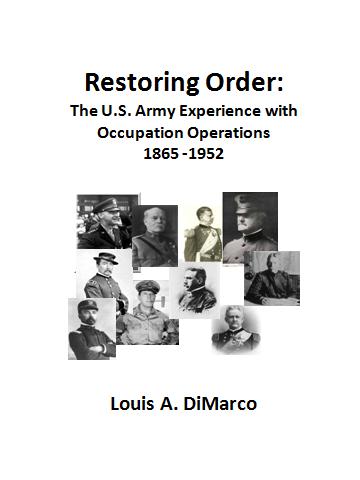 Abstract of my dissertation on US Army occupation operations:
Abstract of my dissertation on US Army occupation operations:
This dissertation examines the influence of the US Army experience in military government and occupation missions on occupations conducted during and immediately after World War II. The study concludes that army occupation experiences between the end of the Civil War and World War II positively influenced the occupations that occurred during and after World War II. The study specifically examines occupation and government operations in the post-Civil War American South, Cuba, the Philippines, Mexico, post-World War I Germany, and the major occupations associated with World War II in Italy, Germany, and Japan. Though historians have examined individual occupations, none has studied the entirety of the American army‘s experience with these operations. This dissertation finds that significant elements of continuity exist between the occupations, so much so that by the World War II period it discerns a unique American way of conducting occupation operations. Army doctrine was one of the major facilitators of continuity. An additional and perhaps more important factor affecting the continuity between occupations was the army‘s institutional culture, which accepted occupation missions as both important and necessary. An institutional understanding of occupation operations developed over time as the army repeatedly performed the mission or similar nontraditional military tasks. Institutional culture ensured an understanding of the occupation mission passed informally from generation to generation of army officers through a complex network of formal and informal, professional and personal relationships. That network of relationships was so complete that the World War II generation of leaders including Generals Marshall, Eisenhower, Clay and MacArthur, and Secretary of War Stimson, all had direct personal ties to individuals who served in key positions in previous occupations in the Philippines, Cuba, Mexico, or the Rhineland. Doctrine and the cultural understanding of the occupation mission influenced the army to devote major resources and command attention to occupation operations during and after World War II. Robust resourcing and the focus of leaders were key to overcoming the inevitable shortfalls in policy and planning that occurred during the war. These efforts contributed significantly to the success of the military occupations of Japan and Germany after World War II.
For more information on this subject and access to the complete dissertation contact me at dimarcol@aol.com.



Lou, thanks for posting this. Looks pretty interesting.
Good Day LTC DiMarco,
This sounds like a fascinating topic. I’d love to read more. I’m concerned you aren’t posting as frequently as you have in the past. I see the Archives list regular posts through Aug 2010, then nothing until January 2011 and nothing since…
Glenn Pence
In your investigations, were there any indications of an attempt by US occupation athorities in the Rhineland to enforce Prohibition in accordance with US practices at the time?
The US Army initiallly tried to limit the sale and consumption of alchoholic beverages (beer and wine) but this was quickly disbanded as German authorities convinced the army that it was unnecessary and completely against the civilian population’s cultural norms. As this occurred in early 1919 it was before prohibition in the US and was done as a means of ensuring discipline and order in the occupied zone rather than some wider national policy.